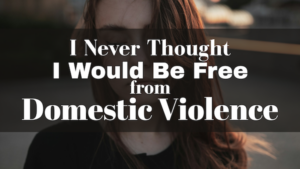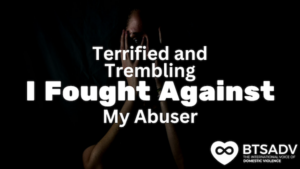It’s okay to feel vulnerable when asking for help. Because domestic violence thrives when victims are isolated, social support has often been restricted or made extremely difficult for a victim to obtain.
Where can you find a support system of people who recognize these challenges? How can you even articulate what you’ve experienced in your own way and at your own pace?
A friend or family member
A friend or a family member may want to help, but lack an understanding of the complexity of domestic violence, including:
- Its deeply penetrating effects,
- Its progression and escalation,
- The power it has over survivors,
- The emotional and physical fear it creates,
- The mental trauma and shame causes.
This is why many friends and family members will tell a victim to leave and then abandon the victim when they do not. It can be crippling to a victim’s already deteriorating self-esteem when someone lacks the understanding of the challenges and dangers a victim faces when leaving.
However, this is not to say that friends and family members cannot be valuable members of your support system. Loved ones can provide emotional support for survivors by being a sympathetic ear and they can also provide physical support by helping a survivor find local resources, keeping their important documents safe, or even providing shelter if needed.
Counselors or mental health professionals
A counselor can help you rebuild your trust, as well as offer a safe place to confide your emotions and experiences. A counselor experienced in domestic violence can be especially beneficial in helping you navigate your healing journey. A good counselor will allow you to find your own conclusions, at your own pace and in your own way.
Some domestic violence agencies have counselors on staff who specialize in domestic violence and can work with survivors. If they don’t have an on-staff counselor or their counselors are not taking clients at the moment, see if the agency has any recommendations for counselors or therapists in the area.
Social Support groups
Domestic violence survivors benefit from feeling a sense of belonging, where others understand without judgment. Abuse makes a person feel abandoned and alone. Sharing one’s experiences with others can help validate your feelings and help you learn that you are no longer alone.
See if support groups are another service that domestic violence agencies in your area offer. If there are none available, you can search the Mental Health America website to see if there are other support groups either in person or online that you could benefit from.
Other professionals
Those experiencing domestic violence can reach out to anyone in the medical profession. They are trained to help connect you to services in your area.
Unfortunately, domestic violence happens in every community. Fortunately, in every community, there are both professionals and survivors ready to help. Understanding and support can be the catalyst to one’s leaving and healing.
If you are having difficulty finding domestic violence social support group, try reaching out to your local domestic violence agency. You can find yours at DomesticShelters.org.
You can also contact the National Domestic Violence Hotline at 1-800-799-SAFE (7233). 1-800-787-3224 (TTY for Deaf/Hard of Hearing). This hotline is available 24 hours a day.
If you need to talk to one of our survivor sisters, or to learn about the programs we offer and how you can be connected to other survivors across the nation, call 855-287-1777.









